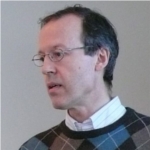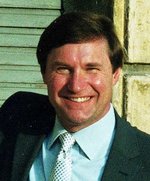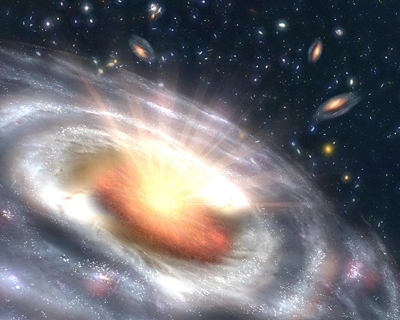
Establishing the philosophy of cosmology
"We live in a golden age of cosmology," says Jeremy Butterfield, a philosopher of physics from the University of Cambridge. Since the mid 20th century, we've seen dramatic advances in our understanding of the Universe. It started with Einstein's development of the general theory of relativity in the beginning of the century, which provided a deeper understanding of the structure of stars and galaxies and their formation. In the 1960s the unprecedented precision of observations provided an enormous stimulus. This, according to Butterfield, therefore also heralds a golden age for philosophy.

Jeremy Butterfield.
Scientific advances have always stimulated philosophical reflection, whether it's Plato, Aristotle, Galileo or Newton. But over the last century, Butterfield says, analytic philosophy, growing up mostly in Vienna and Cambridge between 1890 and 1930, was overly obsessed by logic. This perhaps isn't surprising, as logic at that time was developing rapidly with revolutions in the foundations of mathematics, such as Gödel's incompleteness theorem. "This mesmerised philosophers into thinking that logic and language, and how language represented reality, were the centre of philosophy," says Butterfield. "Unfortunately they therefore downplayed the philosophy of nature, as it used to be called, or natural philosophy."
But fortunately, in the 1970s, philosophers began to once more engage with the details of science, and natural philosophy came back into its own. Philosophers began to really sink their teeth into the two scientific revolutions of the early 20th century: quantum mechanics and relativity. Philosophers have found rich pickings in the strange world of quantum mechanics (you can read more about this in Plus) and Butterfield hopes that a new project will allow them to investigate areas of cosmology just as fruitfully.
It's time
Establishing the philosophy of cosmology is a joint project of the universities of Oxford and Cambridge to bring together philosophers and cosmologists. The project is running workshops over several years to bring philosophers up to speed with current cosmological research and enable them to engage with the big philosophical questions in the area.

What is time?
The first of these was held in Oxford in May 2012 and tackled the tricky problem of time. All of us know that time only goes in one direction – particularly those of us heading towards significant birthdays! But in general relativity there is something called coordinate covariance: you can make arbitrary changes of time and space coordinates and Einstein’s equations stay the same. "Yet we say the Universe is 13.7 billion years old, we always pick out a particular time," says cosmologist John Barrow, one of Butterfield's collaborators on the project. "There seems to be a preferred time, even though the theory does not allow such a thing. This is generally known as the problem of time and there are different philosophical approaches to it."
One reason time is such a problem is that many things in physics are described in terms of rates of change – for example velocity is how our distance changes with time and force is the rate of change of momentum with time – and the rate of change is usually measured with respect to time. But one way around this is to do without time altogether. Stephen Hawking and James Hartle proposed using other things, like density, temperature or the curvature of space-time, to measure rates of change against.

John Barrow
"The whole issue of the nature of time really comes to a head in cosmology," says Barrow. "It's very awkward. A fundamental thing in cosmology is spacetime, not time and space. Time doesn't flow, there is just the block of space-time. The whole of the future is predetermined in this block." This is in contrast to how we usually think of reality, with only space existing as a pre-described block and time flowing along. "There is this awkward problem in trying to reconcile these two pictures of the Universe. This is a good example of a philosophical, almost theological problem, that from the point of view of relativistic cosmology the future exists. It's completely determined. It's just there." (You can read more in our report from the workshop, The puzzle of time, and in our article What is time?)
Infinitely interesting, probably
Philosophers have been able to provide important perspectives in cosmology in the past. For example, philosophers highlighted issues with Newton’s theory of gravity that physicists tended to gloss over – it worked well for a finite universe but if the Universe was assumed to be infinite it could no longer give consistent answers. Einstein's theory of general relativity provided a partial resolution to this problem as this theory is well behaved for finite or infinite universes. But is the Universe finite or infinite? We still don't know the answer. Cosmology provides many opportunities to engage with infinities, providing fertile ground for philosophical study. The project's first event in Cambridge in March 2013, Infinities and cosmology, brought philosophers and cosmologists together to discuss these issues.

Do infinities exist in nature?
Another big question in cosmology is how to deal with probability. According to the current theories we use to describe the evolution of our Universe after the Big Bang, our Universe is just one of an infinite number of possible universes that might have evolved. Understanding how likely it is that our particular Universe evolved, rather than one of the others, often involves comparing different infinities, which is tricky. "As a general rule of thumb, if you read in any scientific paper or popular book that something is likely or unlikely in the Universe, then it's sure to be an unfounded statement," says Barrow.
"If you ask how many even numbers there are, how many odd numbers, there are, or how many numbers all together, then if you're not careful you could get a different answer depending on how you do the counting. That's basically the problem with cosmology," says Barrow. "If there are an infinite number of possible universes that can emerge from inflation [(the brief period of massive expansion that occurred shortly after the Big Bang)], then the probability that a fraction of them have certain properties doesn't seem to be well defined in the way that people have tried to count them so far. You need to be able to count them so that you can say, 'What's the fraction of them, compared with all of them?' "
Probability also plays a central role in interpretations of the counter-intuitive theory of quantum mechanics, an area that has already benefitted from close collaboration between philosophers and scientists. In June 2013 the project ran a workshop in Oxford on quantum cosmology which featured a discussion about philosophical interpretations of the role of probability in cosmology. (You can read more in our articles Struggling with chance.)
Receding from view
One of the major differences between cosmology and most other areas of physics is that cosmologists are stuck with only one data set: our Universe. They can never design experiments to test their hypotheses in a lab, tweaking them to see the effect of subtle changes in initial conditions. And to make matters worse, we can only glimpse a small part of that one-off experiment we live in. As the speed of light is finite, we can only receive light signals from a small part of the Universe, called our past light cone. Given our very limited data set, exactly how can we test our models for the parts of the Universe that we can't see? And just what can we say about the Universe as a whole? (You can read more in The puzzle of time.)
Just as our view of the surrounding landscape is limited as we stand here on Earth, the observable universe has a horizon. Climbing to the top of a tree or standing at the peak of a mountain expands your horizon on Earth, allowing you to see much further. Similarly, as time passes we should be able to see further and further into the Universe as the light from distant stars and galaxies has had more time to reach us.

One day quasars, and all the information they can tell us, will disappear from view. (An artist's impression of a quasar. Image courtesy NASA.)
But there is a hitch. The Universe is expanding, stretching away from us in every direction, at an ever increasing rate. We were able to discover this expansion thanks to changes in light signals from the most distant stars and galaxies in our observable universe. But these are accelerating away from us and one day (when the Universe is about seven times its present age) they will slip beyond our horizon, disappearing from view forever. "Cosmology as a science will cease to exist," says Barrow. The observations of cosmologists in the distant future will be limited to just our galaxy, the Milky Way, and its near neighbours, which will be held together by gravity. (You can read more about this in What is dark energy?)
And in another blow for our future cosmologists, the Cosmic Microwave Background (CMB), the burst of radiation that has revealed so much about the beginning of the Universe, will eventually (when the Universe is 50 times its current age) become indistinguishable from the radiation of our surrounding space. Not only will future cosmologists not be able to deduce the accelerating expansion of the Universe, they also won't have any glimpse of the echoes of the Big Bang. That seems a bleak future indeed.
A golden age for the philosophy of cosmology
Fortunately, today we are, as Butterfield says, in a golden age of cosmology. New data and new ways to analyse and interpret this data is bringing the answers to some of the big cosmological questions tantalisingly close. "There was a time when philosophers and scientists speculated about whether there were other universes, whether our Universe was finite or infinite, could our Universe have been different, and so forth," says Barrow. "But they were just vague speculations. And there would always be someone saying: 'You don't know that the Universe is going to be the same when you reach beyond our visible horizon.' "
"Now [theories] like the inflationary Universe give you a way of making predictions that you might be able to test." The subject is moving into what Newton would have called experimental philosophy: where evidence can be used to shed light on philosophical questions. For example, the CMB should contain hints of the fundamental nature of the Universe: "If you think the universe is finite or infinite, it has consequences for the size of fluctuations in temperature in the cosmic microwave background radiation," says Barrow.
It is new evidence like this that sheds light on fundamental questions about the Universe that could provide rich pickings for philosophers. "The main motivation of this project is not to try to influence how cosmologists do cosmology," says Barrow. Instead the motivation is to share with philosophers the interesting issues and questions in cosmology and the exciting opportunities that new evidence will bring. Barrow and Butterfield hope that this project will help establish a golden age of the philosophy of cosmology.
About the authors
Rachel Thomas is the editor of Plus. She interviewed Jeremy Butterfield and John Barrow in Cambridge in November 2013.
Comments
Anonymous
Prove this statement; The universe is infinite. Possible or impossible? Cosmological minds want to know!
Also, measurement seems to be at the core of this question. What, exactly, may be measured? At this point allow me to introduce to you theology, the philosophy of the immeasurable. It just may be that all that is reasonable, or even rational, may not be measurable.
Many moons hath reason
And some, not her own
Reflect in her seas
Confounding her astronomers
But, Oh!, delighting me!
Anonymous
Unger and Smolin's book "The Singular Universe and the Reality of Time" is an excellent exposition of the case for a new Natural Philosophy, with Unger presenting a philosophical case, and Smolin presenting a cosmological one. Overall, an excellent case is made against the ideas of the multiverse, and of relative time.